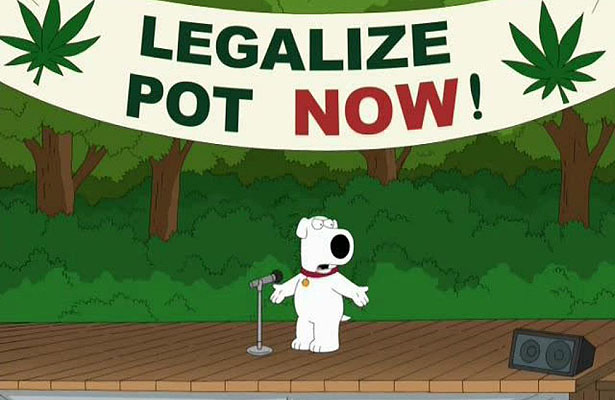It's come a long way from "Just Say No."
The stoner comedy is a long, storied Hollywood tradition. Beginning with Cheech and Chong's 1978 film Up in Smoke and continuing to the present, Hollywood has offered no shortage of cannabis-themed films for the stoner cinephile. But the marijuana-themed TV episode is a relatively recent development. The small screen has had a shorter, stranger relationship with marijuana than its bigger cousin:
It wasn't long ago that marijuana was only referred to as one of many "illegal drugs" on television (as in this brilliantly surreal 1983 guest appearance by Nancy Reagan on Diff'rent Strokes). The First Lady's "Just Say No" message fueled a host of other marijuana-centric "Very Special Episode" TV appearances in the 1980s. on series like Growing Pains and Full House. This culminated in a 1990 made-for-TV special Cartoon All-Stars to the Rescue!—a once-in-a-lifetime collaboration which saw Bugs Bunny, ALF, Garfield, and the Muppet Babies teaching a pot-smoking teenager "the million, billion wonderful ways to say no." But if Cartoon All-Stars to the Rescue! was the biggest accomplishment of the "Just Say No" movement, it was also the grand finale. Just two years later, a marijuana-centric episode of ABC sitcom Dinosaurs featured teenager Robbie pleading to the camera at the episode's end: "Don't do drugs—and help stop preachy sitcom episodes like this one."
Robbie's wish was half-granted. Americans kept doing drugs—in ever-increasing numbers—but sitcoms mostly stopped airing preachy episodes. Though marijuana use was still demonized on television as late as 1997 (in an episode of the WB series 7th Heaven), the drug was also treated with a new frankness in sitcoms like Roseanne, Home Improvement, and That '70s Show.
MORE ON TELEVISION
The increasingly normalized depiction of marijuana use on television, taken in conjunction with the increase in American marijuana users, raises a chicken-or-the-egg question: Was TV making Americans more tolerant of marijuana use? Or was the increase in American marijuana users encouraging TV to depict the drug less negatively? The Parents Television Council, a media watchdog group, argues the former—and they're not happy about it. In a 2010 FOX News debate with marijuana legalization advocate Allen St. Pierre, Melissa Henson, the Director of Communications and Public Education for the PTC, argued that TV shows which feature marijuana users "communicate the idea that it's not only acceptable behavior, but normal behavior."
Henson expanded on her comments earlier this year in an interview with The Atlantic. "There's a wink and a nudge when it comes to pot use on television," she said. "It's pretty much treated as acceptable, as normal... 'This is something that everybody does, and everybody knows that everybody does it.' But in the real world, kids who are caught with pot can suffer serious, life-changing consequences." She pointed to a plot arc on Glee in which a fired high school teacher resold medical marijuana as particularly problematic.
If TV is a propagandistic device for pro-legalization advocates, it's an enormously effective one. TV series like The Simpsons, South Park, and Family Guy have built entire episodes around marijuana legalization, with Family Guy's "420" offering its own annoyingly catchy song—"A Bag of Weed"—as a counterpoint to the "Wonderful Ways to Say No" of Cartoon All-Stars to the Rescue!. And age is a factor: A 2010 ABC study found that 81 percent of Americans support the legalization of medicinal marijuana, while the number drops to 23 percent for Americans aged 65 and older.
And marijuana is more than fodder for sitcoms and cartoons. Perhaps the final sign of marijuana's television growth comes with its appearance in the most ubiquitous of genres: reality television. In the past year, both The Discovery Channel and National Geographic have launched reality series based on the budding medicinal marijuana market. Weed Wars and American Weed offer something that no other series in TV history has (or could have) offered: a glimpse into cannabis growth as a legal, legitimate business. If the blunt realities of Weed Wars and American Weed are any indication, the days of "Very Special Episodes" and "just say no" are officially behind us. And as American cultural attitudes continue to shape—and be shaped by—depictions of marijuana, it's hard to imagine that TV will ever go back.
We want to hear what you think about this article. Submit a letter to the editor or write to letters@theatlantic.com.







